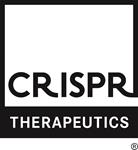News Release
|
View printer-friendly version
PDF Version 481.9 KB
|
<< Back |
-Exagamglogene autotemcel (exa-cel), formerly known as CTX001™ submission to the
-Enrollment and dosing ongoing for CTX110®, targeting CD19+ B-cell malignancies; expecting to report additional data in 2022-
-Enrollment and dosing ongoing for CTX130™, targeting CD70 for the treatment of both solid tumors and certain hematologic malignancies-
-Investigational New Drug Application (IND) cleared by the FDA for CTX112™, its next generation chimeric antigen receptor T cell (CAR-T) candidate targeting CD19+ B-cell malignancies-
-Clinical Trial Application (CTA) cleared by
“We are poised to end the year having made significant strides advancing our broad clinical pipeline of potentially curative gene edited therapies,” said
Recent Highlights and Outlook
- Hemoglobinopathies
- In September,
CRISPR Therapeutics and Vertex Pharmaceuticals concluded discussions with theU.S. Food and Drug Administration (FDA), and the FDA granted exagamglogene autotemcel (exa-cel) a rolling review for the potential treatment of sickle cell disease (SCD) and transfusion-dependent beta thalassemia (TDT). The companies expect to submit the biologics licensing applications (BLA) for exa-cel for rolling review, beginning inNovember 2022 and expect to complete the submission by the end of Q1 2023. In theU.S. , exa-cel has been granted Fast Track, Regenerative Medicine Advanced Therapy (RMAT), Rare Pediatric Disease and Orphan Drug Designations.
CRISPR Therapeutics and Vertex have completed discussions with theEuropean Medicines Agency (EMA) and the Medicines and Healthcare products Regulatory Agency (MHRA) on the submission package for exa-cel and are on track to submit for regulatory approvals of exa-cel for SCD and TDT inEurope and theU.K. by the end of 2022. Exa-cel has been granted Orphan Drug Designation from theEuropean Commission and Priority Medicines (PRIME) designation from the EMA, for both SCD and TDT.
- Two additional Phase 3 clinical trials, CLIMB-141 and CLIMB-151, for exa-cel in pediatric patients with TDT and SCD respectively, are ongoing.
CRISPR Therapeutics continues to advance its anti-CD117 (c-Kit) antibody-drug conjugate (ADC), its internal targeted conditioning program, towards clinical studies.
- In September,
- Immuno-Oncology
CRISPR Therapeutics continues to enroll and dose patients in the pivotal trial of CTX110, its wholly-owned allogeneic chimeric antigen receptor T cell (CAR-T) investigational therapy targeting CD19+ B-cell malignancies. The Company expects to report additional data in 2022.
- In September,
CRISPR Therapeutics announced that the FDA granted RMAT designation to CTX130™, the Company’s wholly-owned allogeneic CAR-T cell therapy targeting CD70, for the treatment of Mycosis Fungoides and Sézary Syndrome (MF/SS), types of cutaneous T-cell lymphoma (CTCL).
- In October,
CRISPR Therapeutics announced the acceptance of an oral presentation for CTX130 for the treatment of relapsed or refractory renal cell carcinoma (RCC) and a poster presentation of pre-clinical anti-CD83 CAR-T data at theSociety for Immunotherapy of Cancer (SITC) 37th Annual Meeting, taking place inBoston, MA or virtually fromNovember 8 to 12, 2022 .
CRISPR Therapeutics announced the clearance of its Investigational New Drug (IND) application by the FDA for CTX112™, its next generation chimeric antigen receptor T cell (CAR-T) candidate targeting CD19+ B-cell malignancies. The Company expects to initiate clinical trials for CTX112 in the first half of 2023.
- Regenerative Medicine
- Enrollment and dosing are ongoing in the Phase 1 clinical trial evaluating the safety and tolerability of VCTX210 for the treatment of type 1 diabetes (T1D). VCTX210 is an investigational, allogeneic, gene-edited, stem cell-derived product candidate, developed in collaboration with
ViaCyte that applies CRISPR Therapeutics’ gene-editing technology to ViaCyte’s proprietary stem cell capabilities for the generation of pancreatic cells designed to evade recognition by the immune system.
- In addition,
CRISPR Therapeutics andViaCyte, Inc. announced the clearance of its Clinical Trial Application (CTA) byHealth Canada for VCTX211, its next generation, allogeneic, gene-edited, stem cell-derived product candidate for T1D, which includes novel edits to promote cell survival. This immune-evasive cell replacement therapy is designed to enable patients to produce their own insulin. The companies continue to progress their third program, VCTX212™, in pre-clinical development for the treatment of Type 1 and Type 2 diabetes. In the third quarter of 2022, Vertex announced it had acquiredViaCyte .
- Enrollment and dosing are ongoing in the Phase 1 clinical trial evaluating the safety and tolerability of VCTX210 for the treatment of type 1 diabetes (T1D). VCTX210 is an investigational, allogeneic, gene-edited, stem cell-derived product candidate, developed in collaboration with
- In Vivo
- Based upon ongoing progress with its in vivo approaches for liver gene editing utilizing both non-viral and viral delivery vehicles,
CRISPR Therapeutics expects to move multiple programs utilizing in vivo approaches into the clinic in the next 12 to 15 months, including programs in cardiovascular disease. The Company’s lead program, CTX310™, targeting angiopoietin-related protein 3 (ANGPTL3) is currently in IND-enabling studies.
- Based upon ongoing progress with its in vivo approaches for liver gene editing utilizing both non-viral and viral delivery vehicles,
Third Quarter 2022 Financial Results
- Cash Position: Cash, cash equivalents and marketable securities were
$1,973.1 million as ofSeptember 30, 2022 , compared to$2,379.1 million as ofDecember 31, 2021 . The decrease in cash of$406.0 million was primarily driven by cash used in operating activities to support ongoing research and development of the Company’s clinical and pre-clinical programs. - Revenue: Total collaboration revenue was
$0.1 million for the third quarter of 2022, compared to$0.3 million for the third quarter of 2021. - R&D Expenses: R&D expenses were
$116.6 million for the third quarter of 2022, compared to$83.5 million for the third quarter of 2021. The increase in expense was driven by development activities supporting the advancement of our pipeline programs, as well as increased headcount costs to support these programs. - G&A Expenses: General and administrative expenses of
$27.0 million for the third quarter of 2022 were consistent with general and administration expenses of$23.7 million for the third quarter of 2021. - Collaboration Expense: Collaboration expense, net, was
$38.9 million for the third quarter of 2022, compared to$22.5 million for the third quarter of 2021. The increase in collaboration expense, net, was primarily driven by increased pre-commercial and manufacturing scale-up costs associated with our hemoglobinopathies programs under our collaboration with Vertex. - Net Loss: Net loss was
$174.5 million for the third quarter of 2022, compared to net loss of$127.2 million for the third quarter of 2021.
About exagamglogene autotemcel (exa-cel)
Exa-cel, formerly known as CTX001™, is an investigational, autologous, ex vivo CRISPR/Cas9 gene-edited therapy that is being evaluated for patients with TDT or SCD characterized by recurrent VOCs, in which a patient’s own hematopoietic stem cells are edited to produce high levels of fetal hemoglobin (HbF; hemoglobin F) in red blood cells. HbF is the form of the oxygen-carrying hemoglobin that is naturally present during fetal development, which then switches to the adult form of hemoglobin after birth. The elevation of HbF by exa-cel has the potential to alleviate transfusion requirements for patients with TDT and reduce painful and debilitating sickle crises for patients with SCD. Earlier results from these ongoing trials were published in
Based on progress in this program to date, exa-cel has been granted Regenerative Medicine Advanced Therapy (RMAT), Fast Track, Orphan Drug, and Rare Pediatric Disease designations from the FDA for both TDT and SCD. Exa-cel has also been granted Orphan Drug Designation from the European Commission, as well as Priority Medicines (PRIME) designation from the European Medicines Agency (EMA), for both TDT and SCD.
Among gene-editing approaches being evaluated for TDT and SCD, exa-cel is the furthest advanced in clinical development.
About CLIMB-111 and CLIMB-121
The ongoing Phase 1/2/3 open-label trials, CLIMB-111 and CLIMB-121, are designed to assess the safety and efficacy of a single dose of exa-cel in patients ages 12 to 35 years with TDT or with SCD, characterized by recurrent VOCs, respectively. The trials are now closed for enrollment. Patients will be followed for approximately two years after exa-cel infusion. Each patient will be asked to participate in CLIMB-131, a long-term follow-up trial.
About CLIMB-131
This is a long-term, open-label trial to evaluate the safety and efficacy of exa-cel in patients who received exa-cel in CLIMB-111, CLIMB-121, CLIMB-141 or CLIMB-151. The trial is designed to follow participants for up to 15 years after exa-cel infusion.
About CLIMB-141 and CLIMB-151
The ongoing Phase 3 open-label trials, CLIMB-141 and CLIMB-151, are designed to assess the safety and efficacy of a single dose of exa-cel in patients ages 2 to 11 years with TDT or with SCD, characterized by recurrent VOCs, respectively. The trials are now open for enrollment and currently enrolling patients ages 5 to 11 years of age and will plan to extend to patients 2 to less than 5 years of age at a later date. Each trial will enroll approximately 12 patients. Patients will be followed for approximately two years after infusion. Each patient will be asked to participate in CLIMB-131, a long-term follow-up- trial.
About the CRISPR-Vertex Collaboration
About CTX110 and CARBON Trial
CTX110, a wholly owned program of
About CTX130 and COBALT Trials
CTX130, a wholly-owned program of
About VCTX210
VCTX210 is an investigational, allogeneic, gene-edited, immune-evasive, stem cell-derived therapy for the treatment of T1D. VCTX210 is being developed under a co-development and co-commercialization agreement between
About
CRISPR Therapeutics Forward-Looking Statement
This press release may contain a number of “forward-looking statements” within the meaning of the Private Securities Litigation Reform Act of 1995, as amended, including statements made by Dr. Kulkarni in this press release, as well as statements regarding CRISPR Therapeutics’ expectations about any or all of the following: (i) its plans for and its preclinical studies, clinical trials and pipeline products and programs; (ii) the safety, efficacy and progress of its various clinical and preclinical programs, including the actual or potential benefits of regulatory designations; (iii) the status of preclinical studies and clinical trials (including, without limitation, the expected timing of data releases, announcement of additional programs, and discussions with regulatory authorities, including the timing of regulatory submissions and the anticipated regulatory filings for exa-cel), as well as expectations regarding the data that is being presented; (iv) its intellectual property coverage and positions of its, its licensors and third parties, as well as the status and potential outcome of proceedings involving any such intellectual property; (v) the sufficiency of its cash resources; (vi) the expected benefits of its collaborations; and (vii) the therapeutic value, development, and commercial potential of CRISPR/Cas9 gene editing technologies and therapies. Without limiting the foregoing, the words “believes,” “anticipates,” “plans,” “expects” and similar expressions are intended to identify forward-looking statements. You are cautioned that forward-looking statements are inherently uncertain. Although CRISPR Therapeutics believes that such statements are based on reasonable assumptions within the bounds of its knowledge of its business and operations, forward-looking statements are neither promises nor guarantees and they are necessarily subject to a high degree of uncertainty and risk. Actual performance and results may differ materially from those projected or suggested in the forward-looking statements due to various risks and uncertainties. These risks and uncertainties include, among others: the potential for initial and preliminary data from any clinical trial and initial data from a limited number of patients not to be indicative of final trial results; the potential that clinical trial results may not be favorable; that one or more of its internal or external product candidate programs will not proceed as planned for technical, scientific or commercial reasons; that future competitive or other market factors may adversely affect the commercial potential for its product candidates; uncertainties inherent in the initiation and completion of preclinical studies for its product candidates and whether results from such studies will be predictive of future results of future studies or clinical trials; uncertainties about regulatory approvals to conduct trials or to market products; it may not realize the potential benefits of its collaborations; potential impacts due to the coronavirus pandemic such as manufacturing and supply chain interruptions and the timing and progress of clinical trials; uncertainties regarding the intellectual property protection for its technology and intellectual property belonging to third parties, and the outcome of proceedings (such as an interference, an opposition or a similar proceeding) involving all or any portion of such intellectual property; and those risks and uncertainties described under the heading "Risk Factors" in CRISPR Therapeutics’ most recent annual report on Form 10-K, quarterly report on Form 10-Q and in any other subsequent filings made by CRISPR Therapeutics with the U.S. Securities and Exchange Commission, which are available on the SEC's website at www.sec.gov. Existing and prospective investors are cautioned not to place undue reliance on these forward-looking statements, which speak only as of the date they are made. CRISPR Therapeutics disclaims any obligation or undertaking to update or revise any forward-looking statements contained in this press release, other than to the extent required by law. CRISPR THERAPEUTICS® standard character mark and design logo, COBALT™, CTX001™, CTX110®, CTX112™, CTX130™, CTX131™, CTX310™, VCTX210™, VCTX211™, and VCTX212™ are trademarks and registered trademarks of CRISPR Therapeutics AG. All other trademarks and registered trademarks are the property of their respective owners.
Investor Contact:
+1-617-307-7503
susan.kim@crisprtx.com
Media Contact:
+1-617-315-4493
rachel.eides@crisprtx.com
Condensed Consolidated Statements of Operations
(Unaudited, In thousands except share data and per share data)
| Three Months Ended |
Nine Months Ended |
|||||||||||||||
| 2022 | 2021 | 2022 | 2021 | |||||||||||||
| Revenue: | ||||||||||||||||
| Collaboration revenue | $ | 94 | $ | 329 | $ | 430 | $ | 900,733 | ||||||||
| Grant revenue | — | 495 | 762 | 1,331 | ||||||||||||
| Total revenue | $ | 94 | $ | 824 | $ | 1,192 | $ | 902,064 | ||||||||
| Operating expenses: | ||||||||||||||||
| Research and development | 116,622 | 83,500 | 358,090 | 237,472 | ||||||||||||
| General and administrative | 27,001 | 23,709 | 81,295 | 76,012 | ||||||||||||
| Collaboration expense, net | 38,859 | 22,464 | 103,427 | 69,354 | ||||||||||||
| Total operating expenses | 182,482 | 129,673 | 542,812 | 382,838 | ||||||||||||
| Total operating expenses | (182,388 | ) | (128,849 | ) | (541,620 | ) | 519,226 | |||||||||
| Total other income, net | 7,264 | 1,101 | 11,171 | 3,806 | ||||||||||||
| Net (loss) income before income taxes | (175,124 | ) | (127,748 | ) | (530,449 | ) | 523,032 | |||||||||
| Benefit (provision) for income taxes | 575 | 595 | (9,151 | ) | (4,123 | ) | ||||||||||
| Net (loss) income | (174,549 | ) | (127,153 | ) | (539,600 | ) | 518,909 | |||||||||
| Foreign currency translation adjustment | (100 | ) | (24 | ) | (195 | ) | (14 | ) | ||||||||
| Unrealized loss on marketable securities | (1,820 | ) | (117 | ) | (17,001 | ) | (673 | ) | ||||||||
| Comprehensive (loss) income | $ | (176,469 | ) | $ | (127,294 | ) | $ | (556,796 | ) | $ | 518,222 | |||||
| Net (loss) income per common share — basic | $ | (2.24 | ) | $ | (1.67 | ) | $ | (6.96 | ) | $ | 6.85 | |||||
| Basic weighted-average common shares outstanding | 78,021,520 | 76,288,534 | 77,547,771 | 75,712,437 | ||||||||||||
| Net (loss) income per common share — diluted | $ | (2.24 | ) | $ | (1.67 | ) | $ | (6.96 | ) | $ | 6.44 | |||||
| Diluted weighted-average common shares outstanding | 78,021,520 | 76,288,534 | 77,547,771 | 80,554,682 | ||||||||||||
Condensed Consolidated Balance Sheets Data
(Unaudited, in thousands)
| As of | ||||||||
| Cash | $ | 494,151 | $ | 923,031 | ||||
| Marketable securities | 1,401,824 | 1,456,098 | ||||||
| Marketable securities, non-current | 77,147 | — | ||||||
| Working capital | 1,781,833 | 2,297,630 | ||||||
| Total assets | 2,353,356 | 2,751,877 | ||||||
| Total shareholders' equity | 1,953,954 | 2,399,460 | ||||||

Source: CRISPR Therapeutics AG


